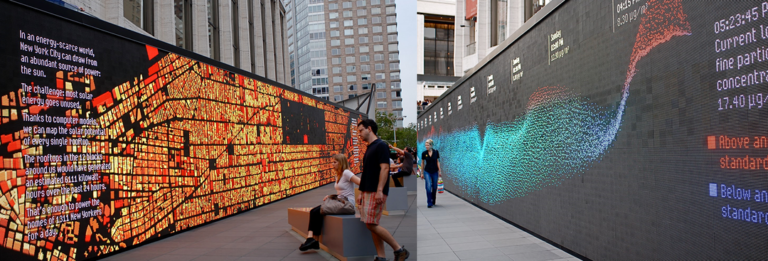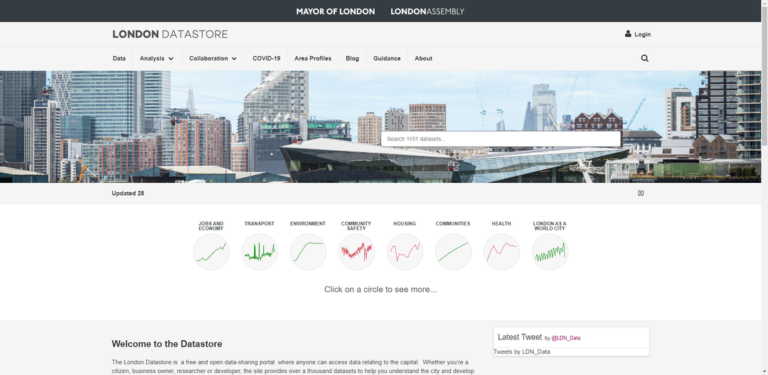Exploration and research on the construction and governance experience of “Smart Cities”
Exploration and research on the construction and governance experience of “Smart Cities”
1. Smart Construction
1. “Smart Infrastructure” and innovative technologies for the regulation of the transportation road network:
[United Kingdom] Smart city construction focuses on digital infrastructure construction. For example, the intelligent road network management system monitors urban road conditions and optimizes the travel time and routes of trucks, and the license plate recognition system is used to collect traffic congestion charges. The construction of digital infrastructure and management platforms through innovative technologies promotes the improvement of citizens’ quality of life and environmental conditions (Chu, 2019).

Driverless cars for intelligent transportation system, London, 2017.
Image source: http://www.e110119.com/news/show-3433.html
2. “Smart Interactive Experience”, showing the charm of digital art:
[United States] The construction of smart cities emphasizes humanization and innovation, and its deployment of sensors, Internet speed, and shared services are among the world’s leaders. Taking New York as an example, the city has fully deployed intelligent facilities such as smart water meters and intelligent garbage compression stations, and developed applications for the visually impaired to take public transportation.IBM has set up an interactive exhibition named “THINK” in New York’s Lincoln Center, presenting the interaction between urban data and real life through art forms (Chu, 2019).

IBM’s THINK exhibition installation provides real-time feedback on neighborhood buildings, road conditions, demographics and more, New York, 2011.
Image source: https://www.topys.cn/article/6493
3. “Smart energy conservation and environmental protection” to promote green and low-carbon construction:
[Nordic] Generally affected by the far-reaching influence of environmentalism, the use of information technology to promote energy conservation, emission reduction and environmental protection as a top priority. Stockholm, Sweden, has included the construction of smart cities in its plan to build a “fossil fuel-free country”, and has promoted the building of a more environmentally friendly and cleaner public environment in Sweden through the synergistic development of complementary fields such as digitization, life sciences and environmental technology. Tax breaks will be offered to companies that install motion sensors to turn off lights automatically and unattended. Urban public transportation is being made smarter by utilizing green energy from biodiesel-producing wastewater treatment plants and other means (Economic Reference News, 2021).

Sustainable building and smart electric transit system, Sweden, 2019.
Image source: https://www.gooood.cn/station-of-being-by-rombout-frieling-lab-rise-interactive.htm
[Dubai] Committed to sustainable urban development and the construction of green and smart buildings, the Sustainability Pavilion at Expo 2020 Dubai reflects Dubai’s commitment to the concept of sustainability. The building itself incorporates a myriad of the latest energy-saving technologies and has been hailed as “the future of global buildings” (Chu, 2019).

Sustainability Pavilion at Expo 2020, Dubai, 2021.
Image source: https://www.gooood.cn/erra-the-sustainability-pavilion-expo-2020-dubai-by-grimshaw.htm
2. Smart Data
1. “From Digital Databases to Digital Resource Utilization” to promote the benefits of the digital economy:
[United Kingdom] According to the Global Open Data Study, the British Government ranks first in the world in terms of data openness. London has designated various governments, agencies, organizations, and businesses to pool their data into a public database network, the London Datastore, which has nearly 2,000 datasets as of 2023, covering arts and culture, business and economy, crime and community safety, population, education, employment, and other 18 broad categories of city data, These open data can be used to develop digital twin city projects, from digital database management to data resourceful applications that drive digital economic growth, and give rise to “Citymapper,” “Countdown,” “Citymap,” “Citymap,” “Citymap,” “Citymap,” “Citymapper,” “Citymapper,” and “Countdown. Countdown”, “Legible London” and a series of apps that can help citizens and tourists plan their travel routes more efficiently, generating an economic effect of up to 130 million pounds per year (Shanghai Municipal People’s Government Development Research Center, 2020).
The database not only facilitates the integration and utilization of data resources, but also serves as an important tool for many city administrations and public services to break down administrative barriers, achieve data sharing, improve public services and address urban challenges.

The London Database, with 18 categories and nearly 2,000 datasets available for open access, 2023.
Image source: https://data.london.gov.uk/
2. “From digital government platform to efficient government response system”, empowering efficiency improvement in government services:
[United Kingdom] The Digital Development Strategy introduced in 2017 makes it clear that digital means improve the efficiency and quality of government services, and the accompanying Government Transformation Strategy (2017-2020) makes it clear that the official website of the UK government will be integrated into the online portals of multi-departmental services to create a unified online government platform, make better use of government public data, and provide cross-departmental sharing of government services. The platform is a platform for better use of government public data and cross-departmental sharing of governmental affairs (Ye, 2021).
[Dubai] Through the continuous upgrading of “mobile government”, “smart government” and “blockchain government”, it meets the ever-changing needs of the public and drives the application of digital technology in other public and private sectors, It has also led to the application of digital technologies, functional reinvention and efficiency improvements in other public and private sectors. Dubai is also using the latest technologies to fight crime, optimize police operations, and reduce police response times. In the AI Artificial Intelligence and Big Data Analytics Center, facial recognition technology is used to locate and track criminals in real time, playing an important role in solving crimes and identifying security gaps in the city.
[Shanghai] The construction of smart cities is at the forefront of China, and has basically realized the construction of an intelligent government service platform, through the urban grid data center to achieve “one network unified management”, collaborative management of the caliber of the city’s various functional departments of the data resources, related to urban infrastructure, urban security and order, people’s livelihood applications and other aspects. In terms of people’s livelihood services, online office halls, “one network for all”, cluster management of government websites, citizen service hotlines and other collaborative government applications have been widely popularized, and the transformation of informationization of various modules in many fields, such as health, education, online learning, public services, pension services, and public transportation, has been basically realized (Zhang, 2018).
The United Kingdom, Dubai, Shanghai and other places are gradually realizing the efficiency of multi-sectoral collaborative government services through the construction of full data centers, unified data standards and application management protocols.
3. “Balancing data sharing and data security” and establishing a sound data management system:
[Shanghai] has initially established a complete data security policy, such as the “Shanghai Municipal Public Data Open Management Measures” and the “Shanghai Municipal Public Data and One-Web Management Measures”, all of which have specialized data security provisions.
[United Kingdom] A comprehensive data management system has been formed, and London has established the “London Office of Data Analytics (LODA)”, a team of experts to standardize data standards, legal documents, process guidelines and open source tools for the use of public data, so as to become a center for supporting cross-sectoral and cross-regional collaboration on public service data, and to further improve the level of public services. level.
[United States] Data management emphasizes government-enterprise cooperation and personal privacy protection. The United States, from the Government in the Sunshine Act to the Open Government Directive, is allowing and encouraging enterprises to copy, develop, sell and other value-added activities on open data. While encouraging openness, New York has developed an open data utilization system to inform the public about the data collection process and ensure that the information is used for city operations and services, in order to improve public understanding of data collection and trust in government.
Several of the cities mentioned above have gradually established a sound data security management system by forming public data expert committees, improving data openness platforms, and introducing relevant policies to cope with the problems posed by data openness.
3. Smart investment models
Government investment and construction “publicization”: the investment and construction mode of intelligent public utilities, which is mainly based on financial investment, is represented by the cases of China, Dubai and other cities, and is generally used by the government to build intelligent basic projects and coordinate data management platforms.
Government-enterprise cooperation “resourcefulness”: PPP (government and social capital cooperation construction) mode and BOT (build-operate-transfer/franchise) mode are the basic modes of cooperation and investment between the government and market enterprises. The cooperation between government and enterprises to promote the transformation of smart construction projects is represented by cases in cities such as the UK, the US and Dubai. For example, the Dubai government and Intel, Huawei and other companies to reach a strategic cooperation of smart construction projects, and invite venture capital, market funds to set up a “Future Foundation”, as Dubai’s other smart city construction projects related to the incubator, to attract global high-tech enterprises and teams to join (Yi, 2023).
Marketization of enterprise construction: The whole process of smart city construction is marketized, and the investing and constructing enterprises sell the operation rights, usage rights or data intellectual property rights of the smart construction projects to obtain revenues and recover costs. Operating companies have a multi-channel profit return mechanism, in addition to regular property service fees, smart parking and other smart equipment usage fees and media advertising costs, but also through cooperation with large-scale e-commerce and community O2O platforms to provide community residents with grocery delivery, door-to-door repairs, laundry and cleaning, and through the platform commission share and other ways to recover costs. Through the above multiple types of operating income, in order to balance the intelligent equipment maintenance, platform operation, personnel management and other related costs invested in the area by the smart operating companies, to realize the integration of the whole life cycle construction and management of the smart city project (Long, 2021).
Reference list:
Chu, T. (2019) Building a Future-oriented Smart City by Drawing on International Experiences: A Study on the Objectives and Ideas of Shanghai’s Smart City Construction during the 14th Five-Year Plan Period., Building a Future-oriented Smart City by Drawing on International Experiences: A Study on the Objectives and Ideas of Shanghai’s Smart City Construction during the 14th Five-Year Plan Period – Baidu Wencu. Available at: https://wenku.baidu.com/view/00d0a9c5356baf1ffc4ffe4733687e21ae45ff4b.html?_wkts_=1701019539013 (Accessed: 26 November 2023).
Economic Reference News (2021) An Overview of Innovation in Overseas Smart City Construction., An Overview of Overseas Smart City Construction Innovations _ Economic Reference News _ Xinhua News Agency Official Website of Economic Reference Newspaper. Available at: http://www.jjckb.cn/2021-06/21/c_1310019368.htm (Accessed: 26 November 2023).
Long, Y. (2021) Long Ying, Deputy Director of Key Laboratory of Eco-Planning and Green Building, Tsinghua University: Science and Technology Innovation to Boost Smart City Construction, Long Ying, Deputy Director of the Key Laboratory of Ecological Planning and Green Building, Tsinghua University: Technology Innovation for Smart Cities 丨2021 Future Cities Technology Summit. Available at: https://www.36kr.com/p/1317610574711560 (Accessed: 26 November 2023).
Shanghai Municipal People’s Government Development Research Center (2020) London’s ‘Smart City’ Construction Lessons for Shanghai, The Experience of London’s ‘Smart City’ Construction for Shanghai_2019_Shanghai Municipal People’s Government Development Research Center. Available at: https://www.fzzx.sh.gov.cn/jcckxx_2019/20200121/0053-10547.html (Accessed: 26 November 2023).
Ye, W. (2021) UK pushes for digital government, China Economy Website (china.com). Available at: http://m.ce.cn/fa/gd/202109/22/t20210922_36934585.shtml (Accessed: 26 November 2023).
Yi, Y. (2023) What are the main contents of new smart city construction? Introduction to the construction model., What are the main contents of the new smart city construction? Introduction to the construction model-Three Leathermen Report. Available at: https://www.sgpjbg.com/info/31760.html (Accessed: 26 November 2023).
Zhang, B. (2018) Shanghai New Smart City Construction Path and Mode Innovation Research., Shanghai new smart city construction path and mode innovation research – BaiduWenku. Available at: https://wenku.baidu.com/view/99c0769af7335a8102d276a20029bd64793e62ba?fr=xueshu&_wkts_=1701019437150 (Accessed: 26 November 2023).


